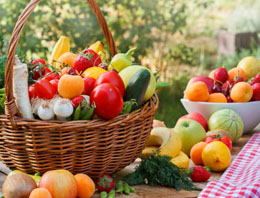Looking for more information on juvenile rheumatoid arthritis diet? Then the following content will help you with that. Here we give you some of the most recommended diets which help in managing juvenile rheumatoid arthritis.

A common type of arthritis occurring in children, juvenile rheumatoid arthritis can be treated with medicines, besides physical therapy. However, it's equally important to follow the prescribed diet so that the symptoms of this condition do not keep recurring.
JRA is an ailment of the immune system wherein there is inflammation of the joint and is accompanied by pain. Moreover, the child may also get fever, enlargement of the lymph nodes or rashes on the body. It's usually the lining of the joints that are inflamed, and these lining are called synovium. It's the synovium which produces a fluid, which is responsible for providing nutrients to the cartilages of the joints, besides cushioning them.
When the synovium swells due to accumulation of excess fluid, released by white blood cells, it causes arthritis pain. You need to take necessary steps to relieve it, or else the condition may aggravate. Planning a proper diet is necessary to relieve pain, and to prevent it from recurring. Here is some information on some of the foods which are helpful in complementing JRA treatment.
Recommended Diets for Juvenile Rheumatoid Arthritis
There are several foods which aggravate pain in the joints and as such you should avoid them - such foods include coffee, tomato, beef, rye, oats, milk, oranges, pork, wheat, corn, etc. However, there are other juvenile rheumatoid arthritis diet which you can have so that the condition does not deteriorate further.
Fish
Abundant in omega-3 fatty acid, fish are an excellent food which you can have for managing juvenile rheumatoid arthritis with diet. Omega-3 fatty acids have the capacity to change the cytokine metabolism of the body, thereby helping in reducing inflammation. Cytokines are nothing but proteins which are secreted by the immune system.
Fruits and Vegetables
Antioxidants are good for reducing inflammation and as such the amount of vegetables and fruits you consume should be high. The levels of antioxidants in children who suffer from juvenile arthritis is low and so it's highly recommended that youngsters have high antioxidant foods.
Have a Diet Rich in Vitamin C
The antioxidant properties of vitamin C help in keeping free radicals away, thereby helping in reducing and containing inflammation and pain of the joints. Studies have found that chances of rheumatoid arthritis in children who consume foods rich in vitamin C are less compared to those who don't have such foods. Moreover, it plays an important part in forming collagen, which is an important part of the bones and cartilages. Some of the foods rich in vitamin C include raspberries, blueberries, strawberries, spinach, cauliflower, cabbage, red pepper and broccoli.
Foods Rich in Vitamin D and Vitamin E
If there is deficiency of vitamin D and E in the body of children, it may aggravate the signs of rheumatoid arthritis, thereby making it necessary to have foods rich in them. Vitamin D helps in strengthening the bones, and as such giving them the much-needed nutrients. Herring, cod, tuna, sea bass, halibut and salmon are rich in vitamin D, so you should try and have them whenever possible. Foods rich in vitamin E includes whole wheat flour, wheat germ, safflower and sunflower seeds, walnuts, hazelnuts and almonds, so it's best to include them in your diet. Vitamin E is necessary to help ease the pain and inflammation.
Gammalinolenic acid, a kind of fatty acid useful for the body, helps in relieving the pain, can be found in borage seeds, rapeseeds and evening primrose. As this acid is not produced by the body naturally, it's necessary to take supplements and a dose of a couple of grams a day is effective. Besides that, consuming tart cherry extract is quite effective in reducing rheumatoid arthritis. You need to consume a couple of spoons of concentrated cherry juice every day and you can see marked improvement in your condition.
Remember: Before taking up the diet, it's always better to consult your doctor, as there may be certain foods to which the child may be allergic.


 A common type of arthritis occurring in children, juvenile rheumatoid arthritis can be treated with medicines, besides physical therapy. However, it's equally important to follow the prescribed diet so that the symptoms of this condition do not keep recurring.
A common type of arthritis occurring in children, juvenile rheumatoid arthritis can be treated with medicines, besides physical therapy. However, it's equally important to follow the prescribed diet so that the symptoms of this condition do not keep recurring.